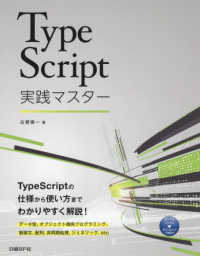- ホーム
- > 洋書
- > ドイツ書
- > Humanities, Arts & Music
- > History
- > prehistory
Description
(Text)
The diffusion of innovations from the Near East into the 'static' surrounding peripheries has become a well-known archaeological paradigm, often summed up as Ex Oriente Lux. While this conflicts with modern, scientifically controlled chronologies, it is difficult to explain as mere local developments and pure chance the appearance of large-scale communication networks, the transformation of power concentrations in the first states, or the diffusion of the wheel, alloyed metals, and writing. The papers in this volume follow two approaches to convene on new insights into the prehistoric and ancient innovation process. Theoretical perspectives attempt to challenge and modify traditional models of innovation diffusion that lack the chronological depth of archaeological sources, while case studies from the Copper, Bronze and Iron Ages of Europe, southwest Asia, and North Africa analyze the specific archaeological and sociopolitical contexts, the technological traditions of innovations, and the specifications of their emergence, spread, and improvements.
(Author portrait)
Florian Klimscha is the head of the Archaeology Division of the Lower Saxony State Museum, Hanover and a specialist for the Neolithic and innovation processes in prehistory. He directs projects at Tel Tsaf (Israel) and Hüde I (Lower Saxony).Svend Hansen is Director of the Eurasia Branch of the German Archaeological Institute. His research focuses on social archaeology and technological innovations. He directs excavations at Pietrele (Romania) and an Advanced ERC Grant on "Technical and Social Innovations in the Caucasus".Jürgen Renn is Director at the Max Planck Institute for the History of Science. His research aims to develop a theoretical understanding of knowledge evolution, taking into account its epistemic, social, and material dimensions. Recent studies focus on the historical origins and co-evolutionary dynamics that have led to the Anthropocene.








